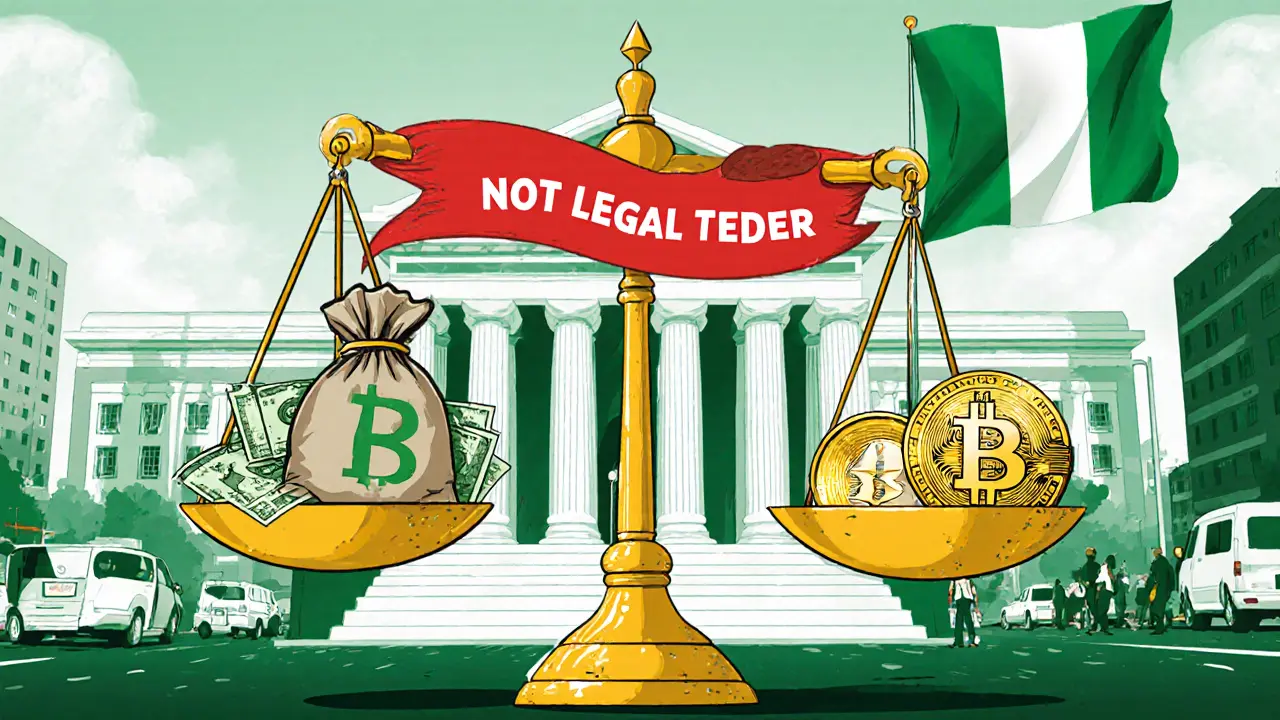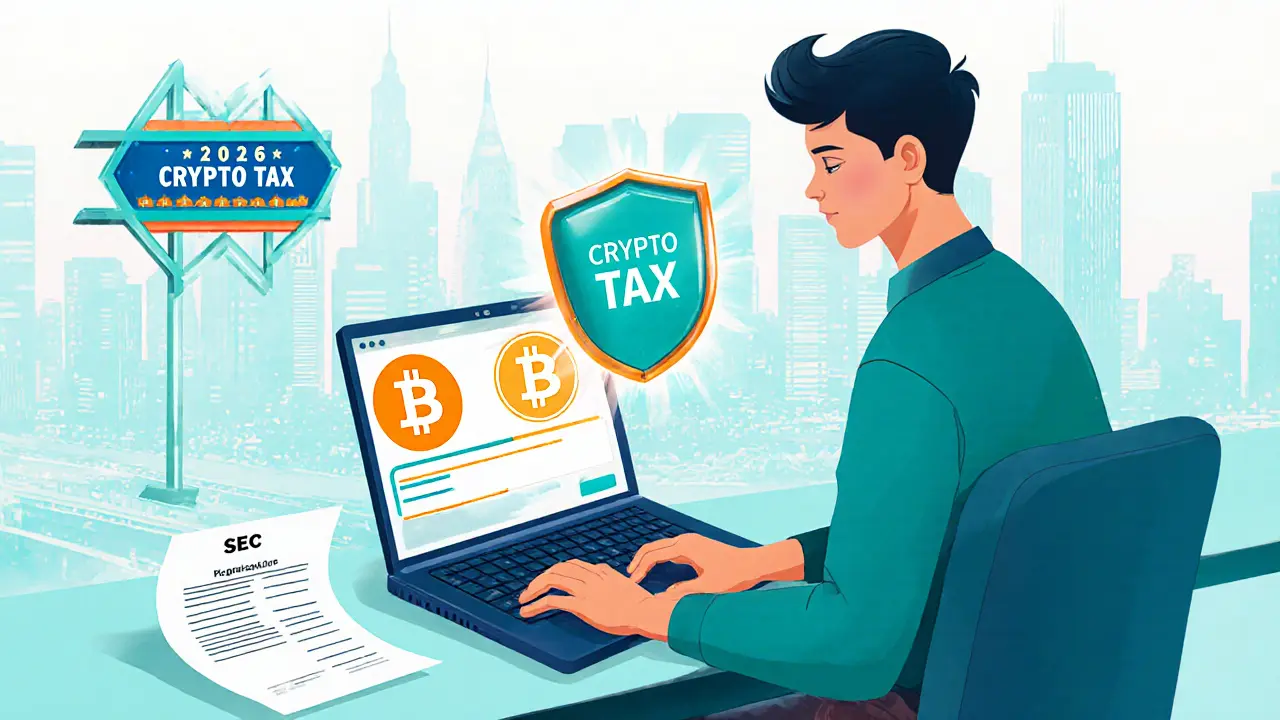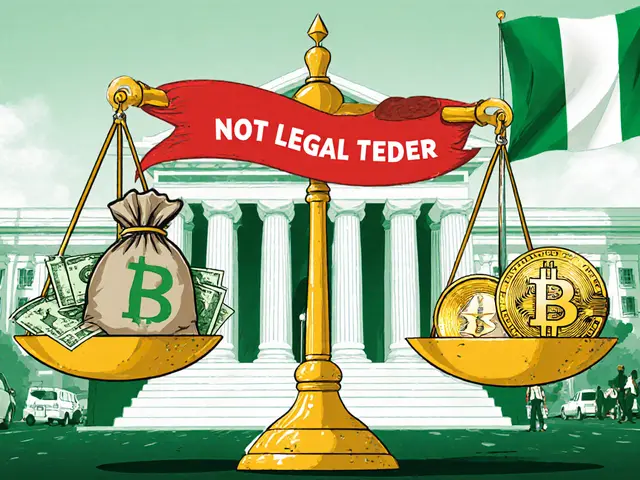Crypto Payments in Nigeria: Legal Status, Regulations & How to Use Them Safely

Crypto Payment Compliance Checker
Check Your Crypto Payment Method
Select the type of crypto payment you're considering to see if it complies with Nigerian regulations.
Compliance Check Results
People keep asking, are crypto payments allowed in Nigeria? The short answer: you can use crypto, but it isn’t legal tender and you must stick to a set of rules that took shape in 2025. Below we break down what the law says, which regulators are in charge, how to pay with crypto without breaking any rules, and what to expect when taxes kick in next year.
What "allowed" really means in Nigeria
In Nigeria, cryptocurrency itself is not illegal. The country simply does not treat digital coins as a replacement for the naira, so you can’t use Bitcoin or Ether to settle a government bill or a payroll that must be paid in legal tender. Instead, crypto lives in a regulated gray‑area‑turned‑formal‑sector thanks to the Investments and Securities Act (ISA)2025.
Cryptocurrency payments in Nigeria are transactions that move value using digital assets rather than the national currency, subject to the rules set by the Securities and Exchange Commission and other financial authorities.
Key regulators and the 2025 legal framework
The ISA2025, signed by President Bola Ahmed Tinubu in March 2025, declared digital assets-including cryptocurrencies-to be securities. That gave the Securities and Exchange Commission (SEC) primary authority over crypto exchanges and Virtual Asset Service Providers (VASPs). The Central Bank of Nigeria (CBN) still controls monetary policy and oversees how banks interact with crypto firms. Meanwhile, the Nigerian Financial Intelligence Unit (NFIU) handles AML/CFT compliance, and the Economic and Financial Crimes Commission (EFCC) assists in fraud investigations.
Licensing requirements for crypto payment providers
Any platform that wants to offer crypto payment services must secure a VASP license from the SEC. The licensing checklist includes:
- Register the business with the Corporate Affairs Commission.
- Submit a detailed compliance manual covering AML, CFT, and Know‑Your‑Customer (KYC) procedures.
- Maintain a minimum capital reserve of ₦50million (about $33,500) to cover operational risks.
- Integrate real‑time transaction monitoring tools approved by the NFIU.
- Undergo a on‑site audit by the SEC before the license is issued.
Failure to obtain or keep the license can trigger a ₦10million fine in the first month, plus ₦1million for each subsequent month of non‑compliance. The SEC also has the power to suspend or revoke a license, effectively shutting the service down.

Who’s licensed and what they offer
The first wave of approvals went to home‑grown platforms like Quidax and Busha. Both provide:
- Direct NGN deposits and withdrawals via local banks.
- Instant P2P matching engines that let users trade crypto without leaving the platform.
- Compliance dashboards that show users their KYC status and transaction limits.
Because they are SEC‑licensed, these exchanges can open corporate bank accounts, issue invoices in naira, and integrate with payment processors-something that unlicensed providers cannot do.
Step‑by‑step guide to making a legal crypto payment
If you want to pay a freelancer, buy goods online, or send money abroad using crypto, follow these steps to stay on the right side of the law:
- Choose a licensed VASP. Look for the SEC registration number on the platform’s “About” page.
- Complete KYC. Upload a government ID, proof of address, and a selfie. The platform will verify you within 24‑48hours.
- Fund your account in NGN. Use a local bank transfer; the VASP will credit your crypto wallet instantly.
- Select the cryptocurrency. Bitcoin and Ether are the most widely accepted, but stablecoins like USDT are popular for low‑volatility payments.
- Enter the recipient’s wallet address. Double‑check the address; crypto transactions are irreversible.
- Confirm and pay. The platform will show you the exact NGN amount you’ll be charged, including any SEC‑mandated fees.
- Save the receipt. The transaction record is required for future tax reporting.
Using a licensed VASP also means the transaction will be logged with the NFIU, satisfying AML obligations automatically.
Taxation - what changes in 2026
Effective January12026, the Nigerian Tax Administration Act (NTAA)2025 treats crypto assets as property. That means you won’t pay tax just for holding coins, but you will owe tax on any profit you realize when you sell, trade, or use crypto for goods and services.
Key points:
- Individual gains are subject to personal income tax, capped at 25%.
- Corporate crypto revenue is taxed at 20% if annual earnings are between ₦25million and ₦100million, and 30% above that threshold.
- All crypto‑related service fees charged by a company are subject to a 7.5% VAT.
Keep the transaction receipts from the step‑by‑step guide; they will form the basis of your tax return.

Risks, compliance tips, and common pitfalls
Even with a clear legal path, you still need to watch out for a few traps:
- Ponzi schemes. The SEC can now seize assets and share telecom records to prosecute fraudsters. Stick to licensed VASPs.
- Unlicensed foreign exchanges. Many global platforms still accept Nigerian users but refuse SEC registration. Using them may expose you to AML penalties.
- Transaction limits. New VASPs often start with a ₦500,000 monthly cap until they build a compliance track record.
- Exchange rate volatility. If you need to pay a fixed amount in NGN, consider stablecoins to lock in value.
Best practice: maintain a separate crypto‑only bank account (available to licensed VASPs) and reconcile all activity weekly.
Licensed vs. Unlicensed crypto payment options (quick comparison)
| Feature | SEC‑Licensed VASP | Unlicensed Provider |
|---|---|---|
| Legal standing | Recognized under ISA2025; can hold NGN accounts | Operates in a regulatory gray area; no NGN banking access |
| AML/KYC compliance | Full NFIU‑approved monitoring, audit trails | Often minimal or no verification |
| Bank integration | Direct links to local banks, faster fiat‑on‑ramp | Reliant on third‑party payment gateways |
| Consumer protection | Subject to SEC penalties, possible restitution | No statutory recourse if funds are lost |
| Fees | Transparent fee schedule, includes 7.5% VAT for corporate services | Variable, often higher due to lack of economies of scale |
Future outlook for crypto payments in Nigeria
Regulators have shown a willingness to refine the framework. Expect:
- Faster licensing cycles as the SEC builds a dedicated crypto division.
- Potential sandbox programmes that let innovators test new payment models under relaxed rules.
- More detailed guidance on stablecoin usage, especially for cross‑border remittances.
All signs point to a more integrated crypto‑fiat ecosystem, but the speed of change will hinge on how quickly licensed operators can meet compliance costs.
Frequently Asked Questions
Can I use any cryptocurrency to pay for goods in Nigeria?
You can use any crypto on a licensed VASP, but merchants must also accept it. Most local vendors prefer Bitcoin, Ether, or USDT because they are widely supported and have stable conversion tools.
Do banks in Nigeria now work with crypto companies?
Yes. Since the CBN’s December2023 VASP Guidelines, banks can open accounts for SEC‑licensed exchanges. This enables direct NGN deposits and withdrawals for users.
What happens if I use an unlicensed foreign exchange?
While the transaction itself isn’t criminal, you risk AML penalties and you have no consumer protection if the platform disappears. Authorities can also freeze the funds if they deem the activity suspicious.
How will the 2026 tax law affect my crypto trading?
You’ll need to report every sale, swap, or payment that results in a profit. The tax rate caps at 25% for individuals. Keeping detailed transaction receipts will make filing much easier.
What are the penalties for running an unregistered crypto service?
The SEC can impose a ₦10million fine for the first month of non‑compliance, plus ₦1million for each additional month, and may suspend or cancel the operating licence.

Darren Belisle
Wow, this guide on crypto payments in Nigeria is a game‑changer, folks!!! It really opens up the conversation about compliance, adoption, and safety-so many angles to explore!!!
manika nathaemploy
i think dis article really helps people understand the legal side, even if some bits are kinda confusing lol. make sure to double‑check the latest SEC updates!
Mark Bosky
From a regulatory standpoint, it is essential to note that the Central Bank of Nigeria has prohibited direct crypto transactions via banks, yet licensed VASPs remain permissible. Therefore, users should prioritize platforms that have SEC approval to ensure compliance.
Caitlin Eliason
Honestly, treating crypto like any other money is a moral imperative-if we ignore it, we’re complicit in financial oppression! 🌐💸 The Nigerian youth deserve safe avenues, not shady back‑door deals. 🚫
Brian Lisk
Crypto payments in Nigeria have evolved dramatically over the past few years, moving from fringe experimentation to mainstream utility. The Central Bank’s 2021 directive banning crypto transactions through banks sparked a wave of innovation among licensed Virtual Asset Service Providers (VASPs). These VASPs are now the primary gateway for Nigerians seeking to move value across borders legally. By registering with a SEC‑approved VASP, users gain access to transparent KYC processes and AML safeguards, reducing the risk of fraud. Stablecoins, particularly those pegged to the US dollar, have become a popular bridge for remittances because they minimize volatility. Peer‑to‑peer (P2P) platforms still thrive, but they operate in a regulatory gray area that can expose participants to legal uncertainty. When using a VASP, it’s crucial to verify the provider’s license number on the SEC’s public registry to avoid unlicensed operators. Transaction limits often differ: lower‑value transfers may be exempt from certain reporting requirements, while high‑value moves trigger stricter scrutiny. Nigerian businesses increasingly accept crypto payments for goods and services, especially in the tech sector, leveraging smart contracts to automate invoicing. However, tax obligations remain a contentious topic; the Federal Inland Revenue Service is still drafting guidelines on crypto gains. Security best practices include using hardware wallets for storage and enabling two‑factor authentication on exchange accounts. Users should also be wary of phishing attempts that mimic legitimate VASP communications. In terms of compliance checking tools, the interactive widget on this article can help you quickly assess whether a specific payment method aligns with current regulations. Lastly, staying informed through reputable news sources and community forums ensures you adapt to any regulatory shifts promptly.
Melanie LeBlanc
Great breakdown! Just a reminder to always keep your private keys offline and to double‑check the VASP’s compliance score before sending large amounts.
Don Price
Everyone’s talking about “compliance” while the real story is that the global elite are using crypto to bypass sovereign currencies. If you think the SEC will protect you, think again-most of these VASPs are eventually taken over by shadowy lobbyists.
Jasmine Kate
Wow, that’s a dramatic claim, but let’s keep it real: the crypto market in Nigeria is booming, and the only drama is how fast people are learning to protect themselves. 🙄
Dawn van der Helm
Love the positive vibe! 🌟 Remember, using a licensed VASP not only keeps you safe but also helps legitimize crypto in the wider economy. 👍
Monafo Janssen
From a cultural perspective, it’s fascinating how quickly Nigerians have adopted crypto as a tool for financial inclusion. Simple steps like checking the VASP’s license can make a big difference.
Michael Phillips
Indeed, the philosophical underpinning of decentralized finance challenges traditional power structures. Yet, pragmatic compliance ensures the technology can thrive without legal setbacks.
Jason Duke
Let’s be clear-if you’re not using a SEC‑approved VASP, you’re basically gambling with your money!!! Opt for verified platforms!!!
Franceska Willis
Ok, but dont forget to read the fine print-many VASPs have hidden fees on small tranfers. Gotta watch out for those sneaky charges!
EDWARD SAKTI PUTRA
I understand the concerns; my advice is to start with a modest amount, observe the VASP’s response times, and gradually increase as you gain confidence.
Bryan Alexander
Stay optimistic! Even if the regulatory landscape feels tough, the community’s resilience will turn challenges into opportunities.
Patrick Gullion
Honestly, I think the whole “compliance” hype is overblown. People can still transact peer‑to‑peer safely if they verify counterparty reputations.
Jack Stiles
Just chilling here, but yeah, keep it simple: use hardware wallets, stick to licensed VASPs, and don’t share your seed phrase.
Ritu Srivastava
It’s morally unacceptable to ignore the ethical implications of crypto laundering. We must demand stricter oversight now.
Liam Wells
While the formal analysis suggests compliance mechanisms are robust, one must remain skeptical of the underlying geopolitical motives that drive regulatory narratives.
Caleb Shepherd
Fact check: As of the latest SEC report, over 30 licensed VASPs operate in Nigeria, collectively processing billions in crypto volume annually.
Lara Decker
Use a licensed VASP.